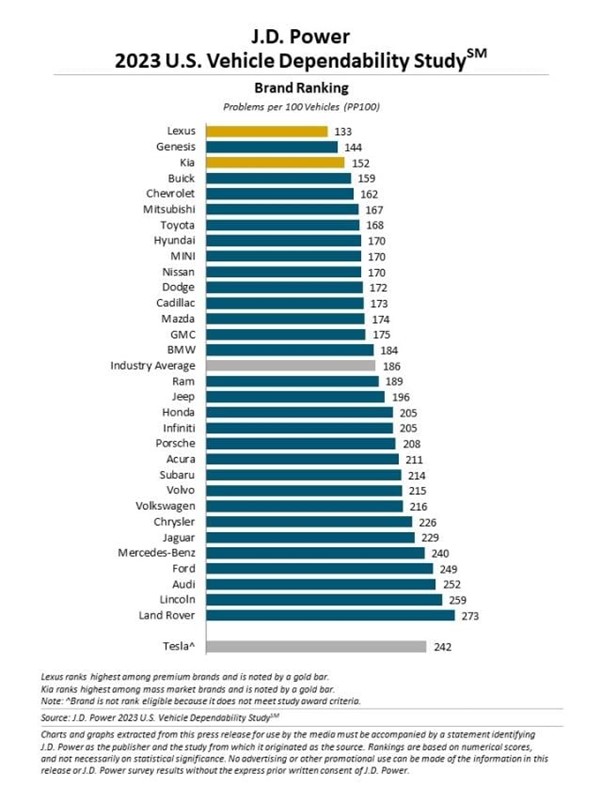Korean & Japanese Vehicle Manufacturers Dominate Dependability Survey
The highly revered J.D. Power U.S. Vehicle Dependability Study has been released for 2023 – revealing the ongoing dominance of the Japanese and Korean manufactured vehicles in terms of their build quality.
The study looks at how 2020 model year vehicles are currently performing in terms of quality, component replacement and appeal. The rankings are compiled based on the number of problems per 100 vehicles.
In 2022, the study was redesigned to cover 184 specific problem areas across 9 major vehicle categories; climate, driving assistance, driving experience, exterior, features/controls/displays, infotainment, interior, powertrain and seats.
There are brands sold in the US that we in Australia are largely unfamiliar with - including Buick, Chevrolet, Cadillac etc. Although many of the vehicles built for the US market would be builit in different factories, in the absence of any similar Australian survey, this provides great insight on many of the brands that occupy our roads.
Top Performers
Lexus took out the top ranking, followed by Genesis. Of course, these are the premium brands of Toyota and Hyundai respectively, evidencing both their attention to detail and the automotive industry penchant for first introducing new concepts and technologies into premium brand vehicles.
Kia took out 3rd spot and was the highest ranked mass market manufacturer agin, coming off the back of their astounding 2022 result as No 1. While its sister company Hyundai slipped from its 2022 No 3 ranking to come in at 8th.
From an Australian perspective, the top 6 ranked brands (excluding Buick & Chevrolet) are either Japanese or Korean – Lexus, Genesis, Kia, Mitsubishi, Toyota and Hyundai.
Toyota took out the most parent company awards with six model-level awards.
While always a strong performer, Mitsubishi considerably improved its ranking from last year – edging out Toyota in what seems like a David v Goliath scenario.
Improved Performances
Still on the wrong side on the Industry Average, but Volvo has moved itself from the tail and we note their number of problems dropped from 256 last year to 215 in the latest survey – a strong move.
Even more impressive was the Ram result – from 2nd last in 2022 to just above the Industry Average, based on a reduction in problems from 266 to 189.

Room For Improvement
Land Rover continues to anchor last spot, a trophy they’ve held since 2020. The years before show them consistently positioned at the tail end.
Ford fell markedly from their 2022 spot below the Industry Average to the bottom of the pack but edged out Audi, Volkswagen’s premium brand. The German manufacturer continues to find itself on the wrong side of the Industry Average, joined by Mercedes-Benz who also fell down the rankings.
Fleet Considerations
From a Fleet Management perspective, some may be asking themselves how this survey from the other side of the world is relevant to us in Australia. Fundamentally, it’s all about Residual Values and ultimately Whole Of Life Cost/Total Cost Of Ownership considerations.
Good build quality and a high level of features are key contributors to resale value and the better it is the lower the fleet holding cost is over the retention period.
The Korean manufacturers have demonstrated this over the last 10 years or so, no longer the ‘cheap and cheerful’ brands more suited to retail sales they are now the powerhouse of both automotive manufacturing quality with corresponding success in Australian fleet and retail sales, in conjunction with Japanese brands.
Another noteworthy observation…the 2020 Australian Corporate Fleet Insights Report (published by ACA Research) showed that Reliability was the most important factor considered by small/medium size fleets in their vehicle selection process.
